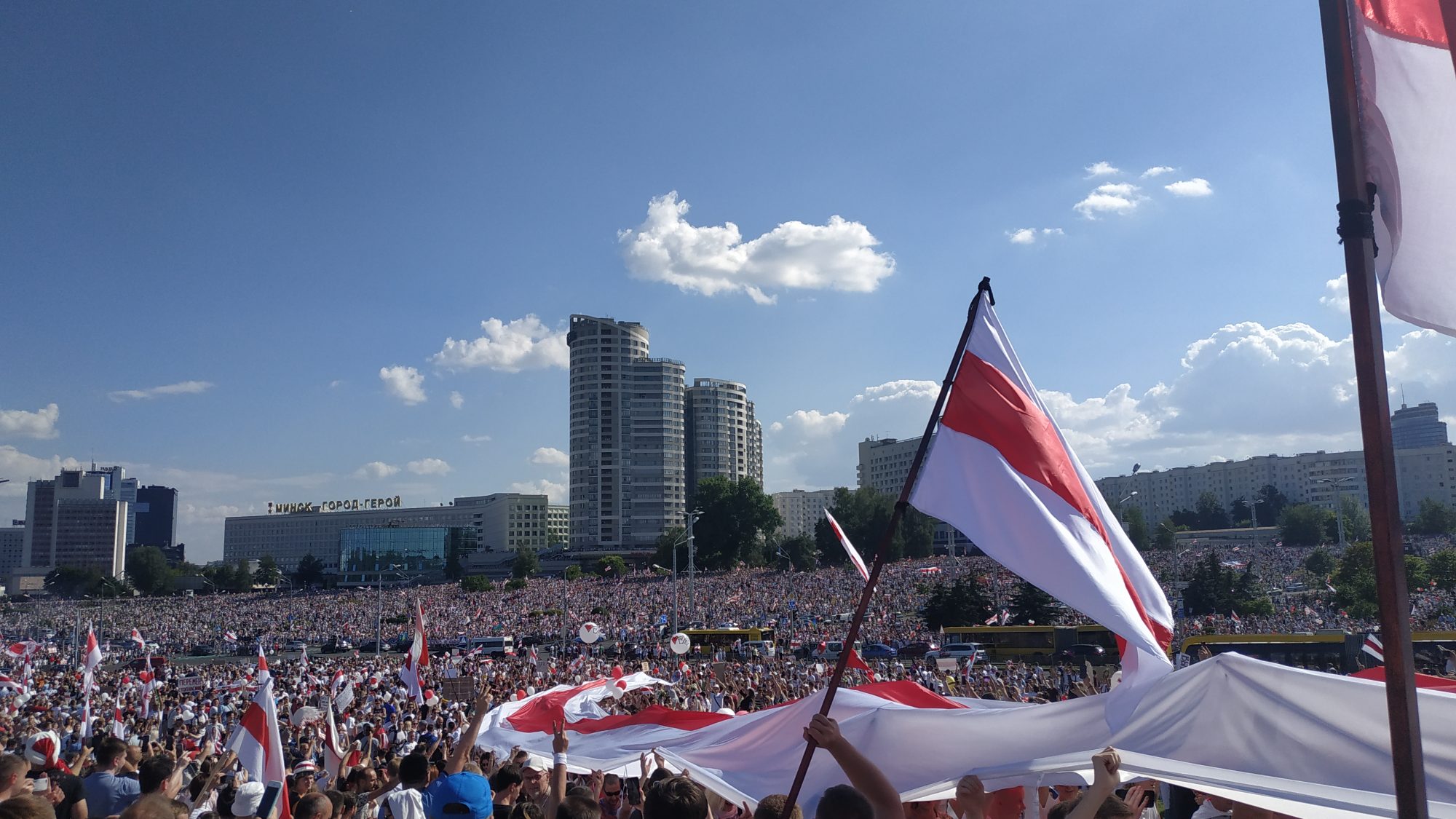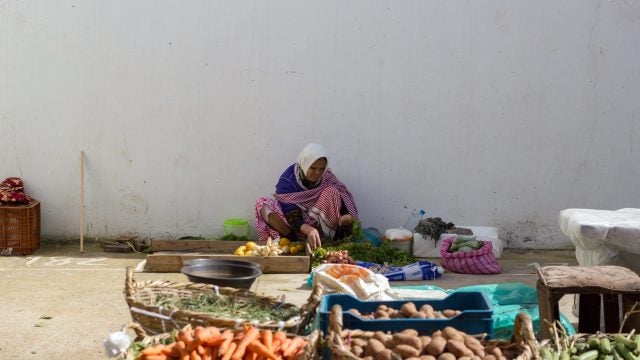
Title: Belarus: Evolution in a Stalemate
It has been a tough year since the contested August 2020 presidential election in Belarus. Incumbent Aliaksandr Lukashenka’s claim to have won by a landslide triggered unrelenting nationwide demonstrations. Although the regime responded brutally, its tight grip on society still could not stifle dissent completely. The political awakening of Belarusians amid ongoing repression lays bare the thirst of the majority for change. However, this stalemate may not be resolved without international support of the peaceful opposition.
Roughly 700,000 Belarusians took to the streets to demand Aliaksandr Lukashenka’s resignation. Peaceful protests were followed by unprecedented police violence and repression. At least five people were killed, almost six hundred are currently behind bars as political prisoners, and hundreds are tried every month on dubious charges. Journalists, human rights defenders, and local activists have been a special target of this crackdown. Arbitrary detentions, physical attacks, and despicable prison conditions have become part of daily life, with all these actions aiming to instill fear, paralyze civic participation, and force dissidents to flee the country. This willful disregard of human rights reached an international scale with the act of air piracy in May 2021, when Lukashenka ordered a fighter jet to divert a European airliner en route from Athens to Vilnius to land in Minsk to arrest a 26-year-old blogger.
The autocrat, having been in power for 27 years, is undoubtedly nervous. However, he seems to be well-protected by his military and security forces, thus appearing to face no real challenges. Historically, this nation of 9.5 million has been in Russia’s shadow, with Lukashenka skillfully balancing between Moscow and the EU and society remaining polarized. Accustomed to the naturally sterile political scene of the authoritarian state and scared by the war in the neighboring Ukraine, a substantial part of Belarusians put up with, if not directly supported, Lukashenka.
Now things have changed. Today, the Belarusians are no longer scared of losing political or economic stability, instead uniting in protest against a rigged election and excessive police violence, and behind calls for the rule of law. Within the stalemate, Belarusian society has begun to evolve, embodying this new national narrative of solidarity and collective strength. It is crucial for the West to be on the right side of history and focus on supporting the evolution of Belarusian society.
Nation Reborn in Popular Protest
Even while mobilization is curtailed, many Belarusians long described as “fence-sitters” have transformed. A recent poll by the Centre for East European and International Studies (ZOiS, Germany) shows that almost 60 percent of Belarusians have become more interested in politics. Concurrently, the demands and expectations of those that took to the streets in 2020 have not been met. According to the survey, protesters expect concrete political changes, such as new elections, political participation, and economic reforms. However, Lukashenka has neither conceded defeat nor stopped the crackdown, and has refused to launch negotiations with the opposition or initiate any of these changes.
In response, pro-democratic Belarusians have stood up united, with solidarity becoming a fact of life. Observers believe that the overall sum of donations to independent media, art projects, and victims of repression has exceeded $10 million, with in-kind contributions being impossible to estimate. Communities and individuals support each other where they can; mutual aid is generous and quick. Thousands of Telegram groups now connect locals living in the same residential area, enabling them to join forces for any non-political or highly political action or just quickly spread information.
What can be described as Belarus’ stalemate has the potential to drive a vital shift in national narrative. The important consequence of this internal crisis is the catalyzing of a stealthy process of nation consolidation and identity building. A new national narrative absorbs new phenomena of solidarity, unity, strength through peaceful action; and well-organized, diverse communities to create a horizontal, representative, spontaneous, and often women-led movement. Even Belarus’ official national anthem, which starts with the line “We, Belarusians, are peaceful people,” envisaged the spirit of this peaceful evolution.
Protest continues, too, though underground. A recent poll by Chatham House shows that roughly 80 percent of Belarusians believe that Lukashenka must leave. Responders describe him as the major obstacle to political stability and economic development and expect him to both start negotiations with opponents and free all political prisoners.
International Solidarity is Vital
International response to this crisis was quite limited at the beginning. The United States and European Union have not recognized the results of the August 2020 elections, instead calling on Lukashenka to release his jailed opponents, stop violence, and start negotiations with the opposition under the auspices of the Organization for Security and Cooperation in Europe to hold new, free, and fair elections. After the abduction of the passenger plane with EU citizens onboard, initial targeted restrictive measures were followed by wide-ranging economic sanctions, ranging from a ban on Belarus’ major exports to restrictions on access to financial markets. Currently, the asset freeze and travel ban list of the European partners includes 166 high-level officials; prominent businessmen and CEOs; and judges, prosecutors, and lawmakers responsible for the violent repressions. The United States has sanctioned nine petrochemical companies that serve as the economic backbone of the regime. The EU has so far stopped cooperation with fifteen companies close to Lukashenka and banned trade in potash and oil products. In a controversial move, Belarusian air carriers have been banned from using European airports and airspace.
Whereas critics downplay these sanctions as too mild to stop the regime from abusing the rights of its citizens, some experts warn that more drastic measures could not only harm European or U.S. business interests, but also confine Belarus to the Russian sphere of influence. Sanctions have indeed played a large symbolic role in demonstrating to the regime that its crimes against Belarusians will not go unnoticed. Even the removal of Belarus as a co-host of the 2021 Ice Hockey World Championship sends a clear signal to the repressive Minsk that it is a pariah state.
What can the West do when the Belarusian regime jails peaceful protesters and sends their children to orphanages? Neither the United States nor the EU has any powerful direct leverage against Lukashenka. Russian president Vladimir Putin does, but as of now his natural interest is to keep his illegitimate counterpart––who is loyal to the Kremlin––in power, thus prolonging the crisis.
The West should demonstrate its goodwill and soft power by ramping up cooperation with the private sector to weaken Belarus’s economic dependence on Russia, intensifying assistance to civic groups and media to help Belarusians shield themselves from disinformation, supporting their urge to identify themselves as a nation different from Russia, and encouraging local grassroots’ resilience. The provision of educational opportunities for youth and financial aid to victims of repression who are forced to flee the country are critical as well. In addition, any direct financial assistance to the state should be tied unequivocally to structural, political, and social reforms.
Conclusions
It is impossible to overestimate the value of international support for Belarusians who would otherwise be left alone in their fight for democracy against the ruthless regime, backed by Lukashenka’s military. Harsh repression has prevented people from taking back to the streets, while the closure of media and NGOs has aimed to destroy civic structures and nip any potential action in the bud. But this heavy-handed response leads to nothing but a stalemate, offering neither any alternative to sate protesters’ wish for change, nor economic reforms to mend the ailing economy. As the evolution of Belarusian society continues, Lukashenka keeps losing his long-enjoyed popular support. Without it, it is a question of time as to how long his regime will be able to sustain itself.
. . .
Maryna Rakhlei is a senior program officer in the German Marshall Fund of the United States office in Berlin, where she analyzes regional developments in Eastern Europe and is part of the team assisting civil society in Belarus. Before joining GMF, Rakhlei covered foreign relations for the Belarusian newswire Belapan in Minsk, wrote for the German newswire DPA and blogged for EuObserver.
Image Credit: Максим Шикунец, Wikimedia, Creative Commons License
Recommended Articles

This paper examines the interrelated crises facing the Maghreb region: water scarcity and gender inequality. It describes the current approach towards addressing water scarcity and how incorporating women’s voices into…

This article compares U.S. and Chinese approaches to artificial intelligence (AI) exports in Africa and examines how these disparate approaches have produced both downstream benefits and challenges for the region.

On May 20, 2025, the World Health Assembly unanimously adopted the World Health Organization (WHO) Pandemic Agreement, an international treaty designed to strengthen pandemic prevention, preparedness, and…